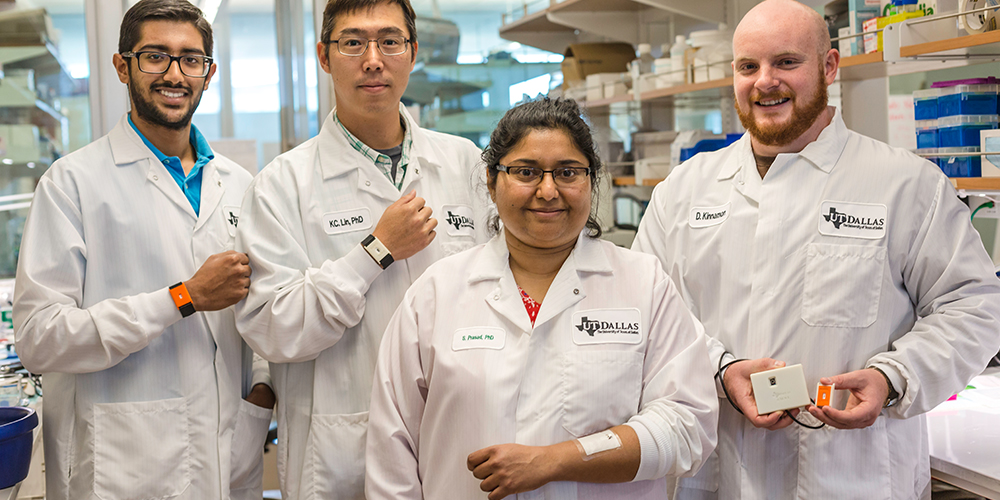Bioengineers Fashion a Fabric Cortisol Sensor
11.15.2017
 From left: Ramesh Ghanta, Kai-Chun Lin, Shalini Prasad and David Kinnamon. (Photo by Sarah Wall)
From left: Ramesh Ghanta, Kai-Chun Lin, Shalini Prasad and David Kinnamon. (Photo by Sarah Wall)
Sweat monitoring sensors — yes, those really exist — can now be embedded directly into clothing, thanks to a team of UT Dallas researchers.
A team led by Dr. Shalini Prasad published a study in October in Nature Scientific Reports on a device that uses microscopic amounts of sweat to dynamically monitor cortisol levels using a prototype sensor integrated into clothing.
“While the amount of sweat used is comparable to our previous work, the mechanism of fluid diffusion is now amenable to microgravity environments,” Prasad explained. “Hence, this technology can be used for cortisol monitoring for high-performance individuals — even astronauts — as well as severely sedentary individuals, for whom monitoring cortisol — a diabetic indicator — can be crucial.”
The Science
Following up on earlier work on glucose monitoring and a long-term wearable diabetic diagnostic tool, Prasad’s research team uses a nanosheet of molybdenum disulfide (MoS2) to move beyond the wristband interfaces used in her previous work.
“We’ve designed this sensor so that it can integrate into fabric or textile interfaces,” said Prasad, a professor of bioengineering in the Erik Jonsson School of Engineering and Computer Science. “It can become a part of your clothing.”
Another advancement covered in the new paper concerns broadening the environments in which the sensor technology will function.
Because the sensor can track dynamic changes to cortisol levels, it will recognize a spike from an injection of synthetic cortisol in conjunction with daily cortisol fluctuations.
“The sensor is used for tracking diurnal changes to cortisol concentrations,” Prasad said. “There’s no product on the market right now that is intended for tracking this measurement while taking supplemental cortisol via prednisolone or a similar prescribed medication.”
The research team also included UT Dallas research engineer David Kinnamon, undergraduate Ramesh Ghanta, postdoctoral researcher Kai-Chun Lin and industrial collaborator Sriram Muthukumar of Enlisense LLC, an adjunct associate professor at UT Dallas.
—Stephen Fontenot
Tags: ECS